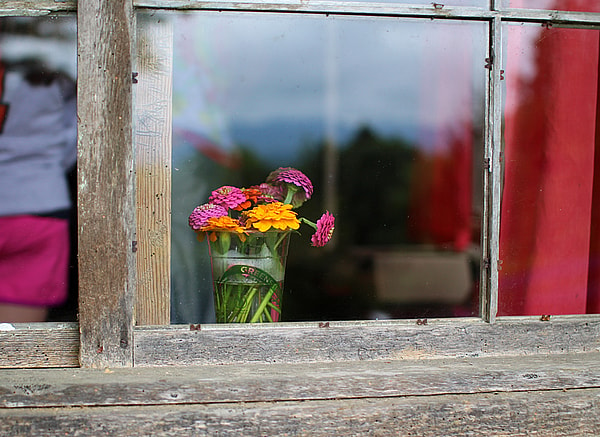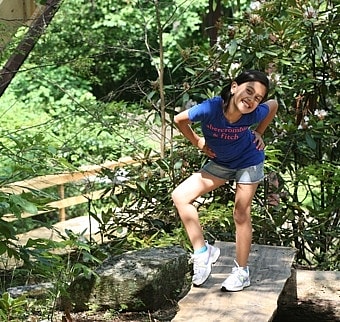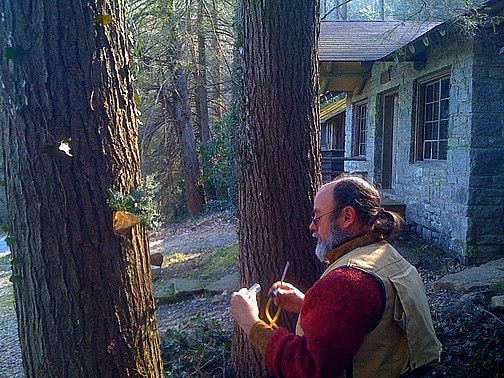This is the time of year when we often have families visiting Rockbrook for a tour of camp. Being in the area for a vacation or because they are (smartly) planning ahead for their daughter’s camp experience, many of these families have heard of Rockbrook from a friend or almuna of the camp, or have simply noticed in their research that Rockbrook is one of the leading camps in the southeast. Lately, many of these families touring the camp have made a similar observation; they were struck by how “beautiful” Rockbrook is. It’s true that we have great old trees, grassy hills and fields, a dining hall, activity areas, and sleeping cabins— all things that other camps have as well, but as one Dad put it, “This place is different.” Rockbrook has a unique aesthetic that makes it unusually beautiful. The place itself has a special feeling that doesn’t take long to appreciate, striking enough even during a short tour.
There is a traditional Japanese sense of beauty called “Wabi-sabi” that I think can help explain this feeling about Rockbrook. Essentially Wabi-sabi is a concept that finds beauty in imperfection and incompleteness. Wikipedia puts it like this, “Characteristics of the wabi-sabi aesthetic include asymmetry, asperity (roughness or irregularity), simplicity, economy, austerity, modesty, intimacy and appreciation of the ingenuous integrity of natural objects and processes.”
There is a beauty, in other words, in all these qualities, especially as they are found in the natural world. Rockbrook, for more than 90 years now, has aimed to preserve the organic character of the camp, being careful not to polish or pave every surface, or straighten every path. In fact, just the opposite is true. We’ve allowed the forest to grow up around us, pruning it as gently as possible. We’ve preserved the rustic, old-fashioned character of our buildings, for example the 19th-century log cabins, Curosty and Goodwill. Even when we build something new, or renovate an existing cabin, we’re careful, when we can, to use rough cut lumber (often harvested from trees here on the property), stone we find here at camp, and native plants to fill out our flower beds. We love the rough boulders jutting from the ground and the crooked branches all around us. The imperfections of these natural materials, these “perfect imperfections” (as the popular John Legend song goes!), add to the beauty of camp. Simply being imperfections makes them part of what’s completely unique, and beautiful, about Rockbrook.
More importantly than our camp facilities, the Wabi-sabi aesthetic goes further and frames the Rockbrook culture too. For example, like the asymmetry of every stone here, we celebrate the “imperfection and incompleteness” in how we perform in the arts and sports activities. There might be a twist in our friendship bracelet, or a bulge in our pottery mug, or splotch in our tie dye t-shirt, but we know that, more than “OK,” these qualities are what make our creations uniquely cool and beautiful. We might climb the Alpine Tower blindfolded (and slowly!), or shoot all our arrows too high, but we are still improving our skills, learning more and having fun nonetheless. When, as it is at Rockbrook, the fun of an activity is simply doing it (with our friends, naturally) rather than insuring the end result is “perfect” or the “best,” when the leap is more important than the landing, then the Wabi-sabi aesthetic is at work.
Finally, and perhaps most importantly, as we celebrate the Wabi-sabi of our natural environment and how we spend our day in camp, we likewise cherish the unique qualities, the “imperfections” and “incompleteness” of personality and appearance in the people around us. In those differences, in those ways that we are “weird,” as Grace put it, each of us enriches our community with our eccentric beauty. That quirky sense of fashion, that bold singing voice, or that quiet fascination with bugs— all cool. At Rockbrook, we learn that, in so many ways, who we really are isn’t ever really perfect, but it’s that very fact that makes us each a beautiful person.
We could try to iron out all these imperfections around us (in the world, in what we do, and in who we are), paint over the elements of Wabi-sabi at camp, but think of what would remain… something pretty plain, pale and predictable. No, camp should be a place to explore the irregular edges of nature, our incomplete knowledge and skills, and who we are as individuals. If the goal of camp is to grow, it simply should be such a place. And when it is, that’s beautiful.









